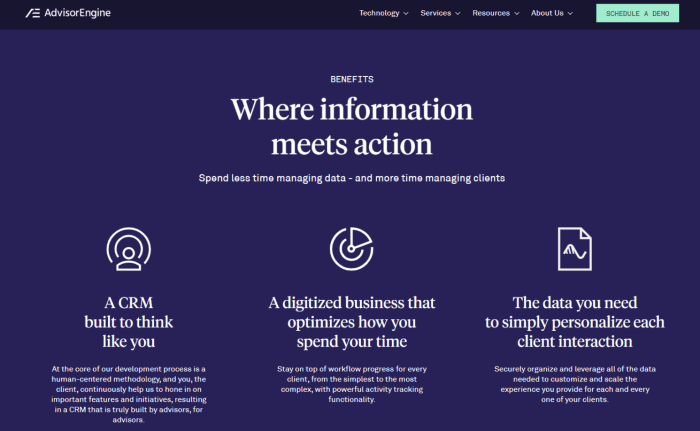In today’s competitive financial landscape, managing client relationships effectively is paramount for success. Financial advisor CRM software offers a powerful solution, streamlining operations and boosting productivity. This comprehensive guide delves into the intricacies of financial advisor CRM systems, exploring their features, benefits, selection criteria, and frequently asked questions. We’ll also cover key terms like client relationship management (CRM), wealth management software, and financial planning software to provide a holistic understanding.
Understanding the Need for Financial Advisor CRM Software
Financial advisors juggle numerous responsibilities, including client communication, portfolio management, regulatory compliance, and business development. Without a robust system, these tasks can become overwhelming, leading to inefficiencies and potentially jeopardizing client relationships. A dedicated financial advisor CRM system acts as a central hub, consolidating all crucial information and automating repetitive processes. This allows advisors to focus on high-value activities, such as strategic planning and client interaction.
Key Benefits of Utilizing a Financial Advisor CRM, Financial advisor crm software
- Improved Client Relationship Management: Centralized client profiles provide a 360-degree view of each client, including contact details, financial information, investment preferences, and interaction history. This facilitates personalized service and strengthens client relationships.
- Enhanced Productivity and Efficiency: Automation of tasks like email marketing, appointment scheduling, and reporting frees up valuable time for advisors to concentrate on core competencies.
- Streamlined Workflow: A centralized system simplifies workflows, eliminating the need to search across multiple platforms for information. This reduces errors and improves overall efficiency.
- Better Compliance and Risk Management: CRM systems often incorporate features for tracking regulatory compliance, ensuring advisors meet industry standards and minimize risk.
- Data-Driven Insights: Many CRM systems offer reporting and analytics capabilities, providing valuable insights into client behavior, portfolio performance, and business trends.
- Improved Client Retention: Personalized service and efficient communication fostered by CRM systems contribute to higher client retention rates.
- Scalability and Growth: As your business expands, a CRM system can easily adapt to accommodate increased client numbers and operational demands.
Essential Features of Top-Tier Financial Advisor CRM Software
While features vary across different platforms, several core functionalities are essential for effective financial advisory CRM software. These include:

Source: vipecloud.com
Core Features:
- Contact Management: Robust contact management tools are essential for storing and organizing client information, including contact details, communication history, and financial profiles.
- Calendar and Scheduling: Integrated calendar and scheduling features allow advisors to efficiently manage appointments and meetings with clients.
- Document Management: Secure storage and retrieval of client documents, such as agreements, statements, and tax returns, is crucial for maintaining compliance and providing quick access to information.
- Communication Tools: Integrated communication tools, such as email marketing and SMS capabilities, enable efficient and personalized communication with clients.
- Reporting and Analytics: Comprehensive reporting and analytics dashboards provide valuable insights into client behavior, portfolio performance, and business trends.
- Workflow Automation: Automation of repetitive tasks, such as client onboarding and follow-up communications, frees up time for more strategic activities.
- Integration Capabilities: The ability to integrate with other financial planning software, portfolio management systems, and accounting software is crucial for seamless data flow and improved efficiency.
- Security and Compliance: Robust security features and compliance with industry regulations are essential for protecting sensitive client data.
Choosing the Right Financial Advisor CRM Software
Selecting the right CRM system requires careful consideration of several factors. It’s vital to assess your specific needs and budget before making a decision.
Key Selection Criteria:
- Scalability: Choose a system that can accommodate your current and future needs, allowing for growth and expansion.
- Ease of Use: The system should be intuitive and user-friendly, minimizing the learning curve for your team.
- Integration Capabilities: Ensure the CRM integrates seamlessly with other software you use, such as portfolio management and accounting systems.
- Security and Compliance: Prioritize systems that meet industry security and compliance standards to protect sensitive client data.
- Customer Support: Reliable customer support is crucial for resolving any issues or questions that may arise.
- Pricing and Features: Compare pricing plans and features to find a system that offers the best value for your investment.
Frequently Asked Questions (FAQ)
- Q: What is the cost of financial advisor CRM software? A: The cost varies widely depending on the features, scalability, and vendor. Pricing models typically include subscription-based fees, with costs ranging from a few hundred dollars to several thousand dollars per year.
- Q: How long does it take to implement a financial advisor CRM? A: Implementation time depends on the complexity of the system and the size of your firm. It can range from a few weeks to several months.
- Q: Can I integrate my existing software with a new CRM? A: Many CRM systems offer integration capabilities with other software, including portfolio management, accounting, and marketing automation tools. However, it’s essential to check compatibility before selecting a system.
- Q: What are the key performance indicators (KPIs) to track with a CRM? A: Key KPIs include client acquisition cost, client retention rate, average revenue per client, and sales conversion rates.
- Q: Is cloud-based CRM better than on-premise CRM? A: Cloud-based CRMs offer greater flexibility, scalability, and accessibility, while on-premise solutions offer greater control over data security. The best choice depends on your specific needs and priorities.
Conclusion: Financial Advisor Crm Software
Implementing a robust financial advisor CRM system is a strategic investment that can significantly enhance efficiency, improve client relationships, and drive business growth. By carefully considering your needs and selecting a system with the right features and functionalities, you can leverage the power of technology to achieve your financial advisory goals. Remember to prioritize user-friendliness, scalability, and integration capabilities when making your decision.
References
While specific product recommendations are avoided to maintain impartiality, research reputable sources like Gartner, Forrester, and Capterra for reviews and comparisons of various Financial Advisor CRM software options. Look for reviews focusing on features relevant to financial advisors, such as compliance features and portfolio management integration.
Call to Action
Ready to streamline your operations and elevate your client relationships? Explore the leading financial advisor CRM solutions available today and request a demo to see how they can benefit your practice. Don’t hesitate to reach out to us for assistance in finding the perfect CRM for your needs!
Question & Answer Hub
What is the average cost of financial advisor CRM software?
Costs vary widely depending on features, vendor, and the number of users. Expect to pay anywhere from a few hundred dollars per month to several thousand, with pricing models often based on subscription tiers.

Source: findmycrm.com
How do I choose the right financial advisor CRM software for my needs?

Source: pttrns.com
Consider factors such as your budget, the size of your client base, your specific needs (e.g., compliance features, specific integrations), and ease of use. Try free trials or demos before committing.
What are the key security features I should look for in a financial advisor CRM?
Essential security features include data encryption, access controls, regular software updates, and compliance with relevant data privacy regulations (e.g., GDPR, CCPA).
Can I integrate my financial advisor CRM with other software I use?
Many CRM systems offer integrations with other financial planning software, accounting packages, and marketing automation tools. Check for API compatibility and available integrations before purchasing.
